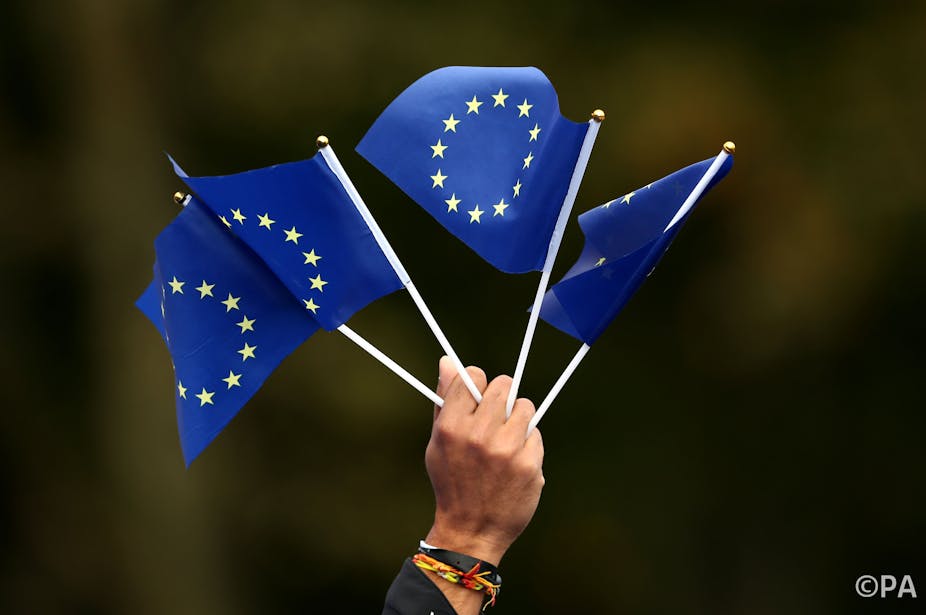Some of Britain’s most eminent historians, worried about the growth and future direction of the EU, have spoken out against what they believe is an attempt to subject millions of British school children to skewed history lessons designed to lead them into unthinking support for the creation of a single, pan-Europe state.
The spokesman for the Historians for Britain group, Cambridge historian David Abulafia, argues that the EU is systematically promoting a determinist view of European history in which European unity is presented as the inevitable outcome of the historical process itself.
This insidious message, he claims, is being planted in the minds of the continent’s youth through biased and suspect history textbooks. No doubt it had UKIP leader Nigel Farage spluttering over his morning pint. But I’d argue that these historians are skewing the facts themselves.
British history at the centre
Anyone who has had contact with history teaching in this country will find the claim of a dastardly EU plot to hijack it surprising to say the least. Few countries can beat the British for putting their own history at the heart of the school curriculum. British history was a major thrust of former education secretary Michael Gove’s revision of the national curriculum.
Whether it is the conditions of the industrial revolution or the horrors of the trenches, British children are overwhelmingly taught only about the experience of their own country. The only major exceptions to the rule are Nazi Germany and Stalin’s Russia, neither of them exactly designed to whet the appetite for greater involvement with the continent. As the European Association of History Teachers, Euroclio, has often found, national history is still the dominant feature of school curricula across the continent.
Of course, there are those who promote integration, but they wield relatively little influence over European school curricula and have met with resistance. Napoleonic War re-enactors were outraged a few years back when their Battle of Waterloo reconstruction culminated in the flying of the European flag instead of the Union Jack.
In 1992, a European history textbook was put together by a team of academics drawn from across the continent, each writing one chapter. The book never caught on (it was never translated into English, for one thing), but the idea is still aired from time to time, usually by politicians with no experience of actually teaching in a classroom.
Abulafia is clearly right that the question of our relationship with Europe needs to be seen in the context of our history, but the argument that our children are somehow being brainwashed into a Euro-outlook by their history teachers simply won’t wash. Even if it did, the rapid growth of Euroscepticism even in the EU’s French and German heartlands suggests a strangely ineffective plot. In fact, the claim misrepresents the very valuable work that has indeed gone on at a European level to turn history teaching from the fuel of conflict into a basis for peace.
Absolute objectivity impossible
All history teaching works to an agenda, whether the patriotic jingoism of the days of Empire or today’s liberal consensus. Absolute objectivity is difficult for academic historians and it is even harder with a young audience, who need their attention grabbed and held on a sunny Friday afternoon.
But all too often this can feed negative perceptions of other people. Since the 1950s, the Council of Europe has been promoting the use of history teaching to combat bias, prejudice and national stereotypes. The Council’s recent project on The Image of the Other looked at this question through a series of bilateral studies: after all, Germans can legitimately grouse if the only image British children receive of them is as Nazis.
The best way round such stereotyping is not to promote European integration but to encourage teachers and children to see history from more than one national perspective.

Some years ago, the Council of Europe funded an exercise I organised which involved bringing students from different countries together to recreate the 1919 Paris Peace Conference. It would have been easy to go for a fuzzy “Euro” approach, but we didn’t. We brought the differences of the past into the open and my students found that, beneath the fashions and music they all had in common, deep national divisions still remained.
I am now working with children at Sawston Village College on a World War I project which is tracing three soldiers’ stories with local links. To their surprise, one was a German. By looking at familiar war experiences from his point of view their understanding of the whole war was transformed. And not an EU flag in sight.
Historians for Britain are right to resist attempts to hijack the subject for the purposes of integration, or for any political purpose. It does not follow, however, that every European initiative is necessarily aiming at further integration, still less that it should be denounced in favour of an exclusively British focus.
Next read: School history exams shouldn’t just be a test of Britishness

